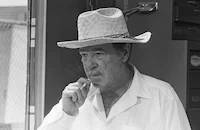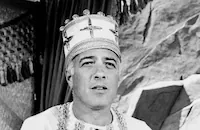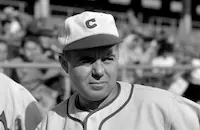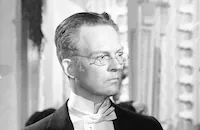Sincerely Yours

Brief Synopsis
Cast & Crew
Gordon Douglas
Liberace
Joanne Dru
Dorothy Malone
Alex Nicol
William Demarest
Film Details
Technical Specs

Synopsis
Pianist Anthony Warrin has attracted many fans by playing a combination of classical, popular and folk music. His manager, Sam Dunne, and his secretary, Marion Moore, who has secretly loved Tony for years, accompany him on his concert tours. Despite his obvious success, Tony feels he must play Carnegie Hall before he can take himself seriously as a musician and is hopeful when a Carnegie representative, J. R. Aldrich, plans to attend his concert in San Francisco. To improve his technique for the performance, Tony visits his former piano teacher, Zwolinski, but the maestro is not at home when Tony arrives. Instead, Tony finds Linda Curtis, a wealthy young woman seeking piano lessons from Zwolinski. Mistaking Tony for Zwolinski, she explains that her parents believe women of her class need proficiency in music to be "accomplished." Tony lets Linda think that he is the older musician until Zwolinski arrives. After a brief exchange of greetings with his mentor, Tony decides that his technique is "good enough" and invites Linda to dinner. At an Italian restaurant, Tony realizes that his wallet is in his other suit and, while he negotiates with the unsympathetic proprietor, Linda pays the bill. The couple then attends a nightclub, where Tony plays an impromptu performance of boogie-woogie. The next day the couple visits a museum, where the guard recognizes Tony and shows them a room filled with antique keyboard instruments formerly played by famous composers and pianists. Inspired by the history of each instrument, Tony tries out each one, and in between playing, proposes to Linda. Although he wants to marry soon, she asks for time, as they have known each other only twenty-six hours. At Tony's San Francisco concert, Linda meets Howard Ferguson, a soldier returning from China at the end of his tour of duty. At intermission, Howard shares with her his regard for Tony's talent and his own determination to return to composing. Aldrich arrives late for the concert, while Tony is taking requests from the audience for an encore. After hearing Tony, Aldrich sets a date for him to play at Carnegie in four weeks' time. However, on the night of his Carnegie performance, Tony suddenly loses his hearing and must cancel. Dr. Eubank diagnoses the problem as a rare, recurring condition that can only be resolved by a dangerous operation that will either cure him or leave him permanently deaf. After asking Eubank for time to decide whether to undergo the operation, Tony stops seeing Linda, while he "thinks things out." At Eubank's suggestion, Tony takes lessons in lipreading from Mr. Rojeck. During a self-imposed exile in his New York penthouse, Tony reads about the life of Beethoven and practices lipreading by using spyglasses to watch people in Central Park. He soon becomes interested in a child, Alvie Hunt, whose handicapped legs prevent him from playing football with other children. Questioning God's existence, Tony considers throwing himself off the balcony, but Marion stops him. After she encourages him to get out of the apartment, Tony follows Alvie and his grandfather to church, where they daily pray for Alvie's healing. On another day, when Tony sees Alvie tell his grandfather that he has lost faith in prayer, he has Marion deliver money to the Hunts for an operation for Alvie. Later, during the night, hearing the tick of his antique clocks, Tony realizes that his hearing has returned, at least temporarily, but continues to follow the activities in Central Park through his binoculars. Tony watches as Mrs. McGinley and her recently married daughter, Sarah Cosgrove, meet each week on a park bench. Sarah, who has married into a wealthy family, is ashamed of her lowly roots and has delayed introducing her husband and in-laws to her mother. When Tony sees Sarah cancel an outing with her mother for a charity event in which her in-laws are involved, he escorts Mrs. McGinley to the event after treating her to a new dress and hairstyle. Surprised to encounter her mother, Sarah introduces Mrs. McGinley to the Cosgroves. Although mother and daughter are reunited, Tony's happiness is short-lived when he again loses his hearing. Although Sam knows about the recurrence, Tony asks him not to trouble Marion with the news. Marion, knowing Linda will take care of Tony, hands in her resignation when the couple set their wedding date. On Christmas Eve, Tony and Marion exchange presents and she says goodbye. Sad that she is leaving, Tony watches her from the balcony. As her taxi drives away, Linda's car approaches and Tony sees her meet Howard on a park bench. Tony watches as Linda admits to Howard that she loves him, but plans to remain with Tony because of his illness. When she comes upstairs to his apartment, Tony tells Linda that he saw her with Howard, and believes they belong together. After she departs, a recovering Alvie and his grandpa come to visit. Tony gives Alvie a football and helmet, and Alvie presents Tony with a charm that he wore in the hospital for courage. The charm convinces Tony to undergo his own operation, which, to his relief, restores his hearing. Later, when he performs an all-classical concert at Carnegie Hall, his many friends attend, while Sam and Aldrich listen backstage. Afterward, Aldrich suggests that Tony focus on classical music, but Tony says he can never give up his "old friends." For an encore, Tony plays "When Irish Eyes Are Smiling" for Mrs. McGinley, and she and Mrs. Cosgrove sing along, soon joined by the rest of the audience. Tony segues into a football victory song for Alvie, and for Linda and Howard, Tony plays, and then tap dances to, the song "Tea for Two." After taking his final bows, Tony finds Marion waiting for him and welcomes her back with a kiss.

Director

Gordon Douglas
Cast
Liberace

Joanne Dru

Dorothy Malone

Alex Nicol

William Demarest

Lori Nelson
Lurene Tuttle

Richard Eyer
James Bell
Herbert Heyes

Edward Platt

Ian Wolfe
Jack Daly
Barbara Brown
Johnstone White
Otto Waldis
Isabel Randolph
Guy Williams

Ray Walker
Elliott Kelly
Charlott Knight
Lillian Culver
Jeanne Tatum
Ray Montgomery
Jean Andron
Peggy Leon
Ethyl May Halls

Tito Vuolo
James Stone
Diana Brewster

Don Dillaway
Donna Fick
Darryl Duran
Michael Winkleman
Crew
Al Alleborn
Ernest R. Ball
Gordon Bau
Henry Blanke
Lew Brown
Edward Carrere
Frédéric Chopin
William H. Clothier
Martin Eisenberg
Rudolf Friml Jr.
George Gershwin
George Graff Jr.
Seymour N. Heller
George James Hopkins
John R. Jacobs Jr.
H. F. Koenekamp
Charles B. Lang
Liberace
George Liberace
Owen Marks
Chauncey Olcott
Gordon Robinson
Michael J. Shea
Howard Shoup
Peter Ilyich Tchaikovsky
Dolph Thomas
Wladimir A. Timm
Jaromir Vejvoda
Demetrios Vilan
Irving Wallace
Paul Francis Webster
Vincent Youmans

Videos
Movie Clip



Film Details
Technical Specs

Articles
Sincerely Yours (1955) -
It's based on the Jules Eckert Goodman play "The Silent Voice," which had already been adapted to the screen twice, both times under the name The Man Who Played God and both with George Arliss in the role of a pianist going deaf and retreating from the public eye. The story was reworked for Liberace by producer Henry Blanke and screenwriter Irving Wallace. Anthony Warrin is a concert pianist with a common touch, chatting with the audience and mixing popular tunes and American folk songs in with his classical repertoire. "He gives pleasure to everyone," remarks his manager Sam (venerable character actor William Demarest), but what he really wants to do is play Carnegie Hall. And then, just as that chance is within his reach, he loses his hearing and retreats to his lavish Park Avenue apartment, peering out into the world with a pair of high-powered binoculars and following the dramas that play out in the park below by reading lips. It's like a benevolent twist on Rear Window (1954).
Sincerely Yours plays to Liberace's strengths: his showmanship, his audience rapport, his mix of stylistic flamboyance and down-to-earth manner. He follows a classic recital with a request for "Chopsticks" from a little girl and transforms it into a dynamic showpiece. He takes the stage at a nightclub and gives a boogie-woogie demonstration complete with audience participation. He plays everything from Tchaikovsky and Chopin to George Gershwin to "When Irish Eyes Are Smiling" and "The Beer Barrel Polka" with his familiar grin, and even punctuates a performance by tap dancing his way off stage. Anthony Warrin, like Liberace himself, is the artist as public entertainer, a showman with a populist touch, and this was the rare Hollywood film where a real keyboard virtuoso played the piano genius on screen. Liberace even composed and sang the title song (the lyrics were by Paul Francis Webster).
The film also adds not one but two romantic interests: Joanne Dru as his loyal secretary, who is secretly in love with him, and Dorothy Malone as a society beauty he courts in a whirlwind romance before retreating from the public. Along with Demarest, a longtime character actor on both the big screen (Preston Sturges considered him his good luck charm) and on TV (known to a generation as Uncle Charlie on My Three Sons), viewers may recognize Edward Platt (Warrin's doctor) from Get Smart! and Ian Wolfe (his lip-reading teacher) as the lecturer from the observatory scene of Rebel Without a Cause (1955).
Sincerely Yours was well received in Hollywood previews and Warner Bros. was poised for a hit. The national press, however, was less enthusiastic. Bosley Crowther described Liberace as "oozing dimpled sincerity from the screen, frequently skimming the glistening keyboard and bestowing his smile like a kiss." Audiences stayed away and the film flopped, much to Liberace's frustration. "I feel there is a public which will awaken to the film's theme, which is based on my philosophy of life: to bring happiness to people," he told Hollywood Reporter in 1956. They didn't and Warner Bros. chose to pay off Liberace rather than roll the dice on the second film in his two-picture contract. Apart from an appropriately, knowingly flamboyant turn in the 1965 comedy The Loved One, it was Liberace's last big screen performance. Not that his career needed it. He continued on for decades making TV appearances with his trademark style and performing as a star attraction in Las Vegas with increasingly bigger and more extravagant shows.
Sources:
Liberace: An American Boy, Darden Asbury Pyron. University of Chicago Press, 2000.
Liberace: An Autobiography, Liberace. G.P Putnam's Sons, 1973.
"Smiling, Sincere; Liberace Is Emoting at the Paramount," Bosley Crowther. The New York Times, November 3, 1955.
"Dueling Liberaces: 'Sincerely Yours' (1955) vs 'Behind the Candelabra' (2013)," Lou Lumenick. New York Post, May 33, 2013.
AFI Catalog of Feature Films
IMDb
By Sean Axmaker

Sincerely Yours (1955) -
Sincerely Yours
By Frank Miller
Sincerely Yours
Quotes
Trivia
The melody for the theme song ("Sincerely Yours") is taken from a Chopin Etude.
Notes
New York Times and Hollywood Reporter reviews describe Sincerely Yours as a recreation of Liberace's concert performances and a remake of Warner Bros.' 1932 film The Man Who Played God (see AFI Catalog of Feature Films, 1931-40), which was also based on the Jules Eckert Goodman play. Although their appearance in the film has not been confirmed, Hollywood Reporter news items add the following actors to the cast: Doyle Brooks, Emmett Cody, Louise Lane, Jodi Kelley, John Graas, Shorty Rogers, Jimmy Fiuffre, Bud Shank, Marty Paich, Gene Gammage, Bob Manners and Michael Vallon.
Despite the film's generally favorable reviews and the popularity of Liberace's television show, which ran from 1952 through 1955, Sincerely Yours was unsuccessful at the box office. As an explanation, a December 1955 Hollywood Reporter article speculated that Liberace's television fans were used to seeing him for free and a Los Angeles Mirror article suggested that his fans, mostly middle-aged and older women, were not part of the younger, movie-going crowd. Although the Hollywood Citizen-News review reported that Sincerely Yours marked Liberace's acting debut, he had previously appeared in two other films, the 1950 Universal production South Sea Sinner as a maestro and RKO's 1951 production Footlight Varieties as himself. For information about other films based on the Goodman play see the entry for The Man Who Played God, in AFI Catalog of Feature Films, 1931-40.

Miscellaneous Notes
Released in United States Fall November 1955
Remake of "The Man Who Played God" (1932) directed by John G Adolfi.
Released in United States Fall November 1955













